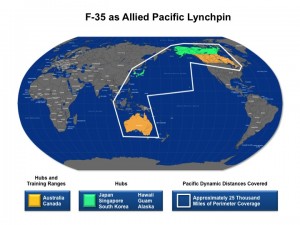The F-35 is built to become a global plane.
The defense industrial agreement underlying the program have both that intent and if realized that impact.
In a recent Japanese piece on the F-35 this was underscored.
The fighter jet is being developed by an international consortium led by U.S. aircraft giant Lockheed Martin Corp.
We have written elsewhere about the strategic impact of F-35 logistical hubs in the Pacific on the capabilities of the F-35 as a fleet.
https://www.sldinfo.com/re-shaping-us-forces-for-a-pacific-strategy/

According to a recent piece in The Japan Times, Japanese participation in the F-35 can allow Japanese firms to become part of a global supply chain.
And this has been a strategic and practical problem for the efficiency of Japanese defense firms in the past.
As Richard Weitz has highlighted:
But a consensus has yet to emerge on how the Japanese defense industry should best respond to the new circumstances.
Japan’s restrictive export policies deny its defense industry opportunities to achieve economies of scale through the sale of military equipment to foreign countries, considerably increasing the costs of indigenously produced military products.
They also discourage Japanese defense firms from investing in new research and development since the absence of potential foreign customers limits the potential sales of any product, no matter how innovative.
https://www.sldinfo.com/japanese-defense-procurement-at-a-turning-point/
The Weitz piece was entitled “Japanese Defense Prourement at a Turning Point.”
The F-35 program can help Japan turn the corner not only on capability but on defense efficiencies.
According to the Japan Times piece published on February 5, 2013:
The government would allow the export of Japanese-made parts for the U.S. F-35 stealth fighter as an exception to Japan’s long-standing ban on weapons exports, sources said Monday.
Japan intends to acquire F-35s, but domestic defense contractors have yet to commit to join on its production.
Presuming such contractor participation, Chief Cabinet Secretary Yoshihide Suga is expected to endorse parts exports to third countries in a statement soon to be issued, despite concerns that the use of Japanese parts for them might conflict with the nation’s policy of avoiding any possible aggravation of international conflicts.
Such concerns have been fueled as Israel is on the list of countries expected to acquire F-35. Tensions between the Middle Eastern country and its neighbors are perpetually high.
Suga is expected to say in the statement that Japan’s participation in the international development of the F-35 would contribute to enhancing the country’s national security.
He will also state that the export of fighter jets made with Japanese parts to a third country would not run counter to the national arms export ban, on the grounds that Japan and the United States will strictly control shipments, the sources said.
http://www.japantimes.co.jp/news/2013/02/05/national/parts-for-f-35-would-evade-export-ban/

